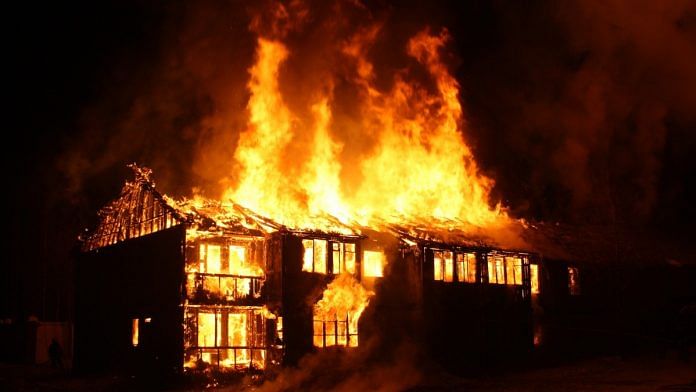New Delhi: Attacks on Bangladesh’s Hindu minority during Durga Puja celebrations last week left at least six dead and several injured. Police have so far arrested 450 people and filed 71 cases in relation to the violence, which allegedly began after a blasphemous post on social media about the Quran.
Prime Minister Sheikh Hasina has promised strict action, and her government has unequivocally condemned the incidents. The country’s foreign affairs ministry said in a statement Tuesday: “It’s regrettable that the local elements that had opposed Bangladesh’s independence 50 years ago are still propagating their toxic narratives to instigate violence, hatred and bigotry.”
However, this is not the first instance of communal violence in Muslim-majority Bangladesh. Since 2013, at least 3,600 such attacks have taken place in Bangladesh, according to Ain o Salish Kendra (ASK), a Bangladeshi human rights organisation.
Attacks not new
Hindus make up 8.5 per cent of Bangladesh’s 170 million population, while Muslims account for 90 per cent.
According to government data, the Hindu population stood at 13.5 per cent in the 1980s. They reportedly accounted for about 30 per cent of the population at the time of Partition in 1947.
“The reason behind the attacks is to drive away minorities from their homes, to minimise the minority population of Bangladesh,” Rana Dasgupta, general secretary of the nonprofit Bangladesh Hindu Buddhist Christian Unity Council (BHBCUC), has been quoted as saying by the German news website DW.
According to the country’s 2011 Housing and Population Census, Hindus in Bangladesh have presence across all regions, with Khagrachari (16.81 per cent), Magura (17.92 per cent), Bagerhat (18.35 per cent), Narail (20.56 per cent), Thakurgaon (22.56 per cent), Khulna (22.68 per cent), and Moulvibazar (24.59 per cent) among the districts with a larger concentration.
However, there has been an exodus of Bangladeshi Hindus.
Research by an economist and professor at Dhaka University, Abul Barkat, concluded that Bangladesh witnesses a daily exodus of 750 Hindus, most of whom try to get into India in the hopes of a more secure future and better economic conditions.
The persecution of minorities in Bangladesh — apart from Pakistan and Afghanistan — is also among the stated objectives of the controversial Citizenship Amendment Act, brought in by the Modi government in December 2019. The law seeks to make the road to citizenship easier for six minority communities from the three nations.
Also read: ‘So many dreams lost in a flash’: Bangladesh cricketer Mortaza condemns attacks on Hindus
Religious freedom in Bangladesh
Religious freedom in Bangladesh has had a tumultuous journey. When the country was founded, it had a secular constitution.
In the 1970s, “secularism” was removed from the constitution by the fifth amendment, and, in the late 1980s, Islam was declared the state religion.
In 2010, a high court order said: “Bangladesh is now a secular state as the Appellate Division (of the Supreme Court) verdict scrapped the fifth amendment to the constitution… in this secular state, everybody has religious freedom, and therefore no man, woman or child can be forced.”
Even so, experts say there is still ambiguity on religious freedom in the country.
“The lack of a clear position on where Bangladesh stands vis-à-vis state and religion has helped breed fundamentalism, extremism, and anti-West sentiments in that country,” Shafi Md Mostofa, an assistant professor of World Religions and Culture at Dhaka University’s Faculty of Arts, argues in a September 2020 piece in The Diplomat.
Experts, this DW report adds, also say an absence of support from mainstream political parties — including the ruling Centre-Left Awami League and the Jamaat-e-Islami, the largest Islamic party — has only deepened the divide.
The Prime Minister has hinted that communal violence in India was having an impact on Bangladesh. “India did help us in the liberation war (of 1971) and we will remain ever grateful for the support… But they (India) have to be aware that such incidents should not take place there which would have an impact on Bangladesh, and the Hindus in our country will suffer,” she said, virtually speaking to the Hindu community at a temple in Dhaka last Thursday.
(Edited by Arun Prashanth)
Also read: The Bangladesh ‘machete killings’ case of LGBTQ+ activists in which 6 Qaeda affiliates will hang



